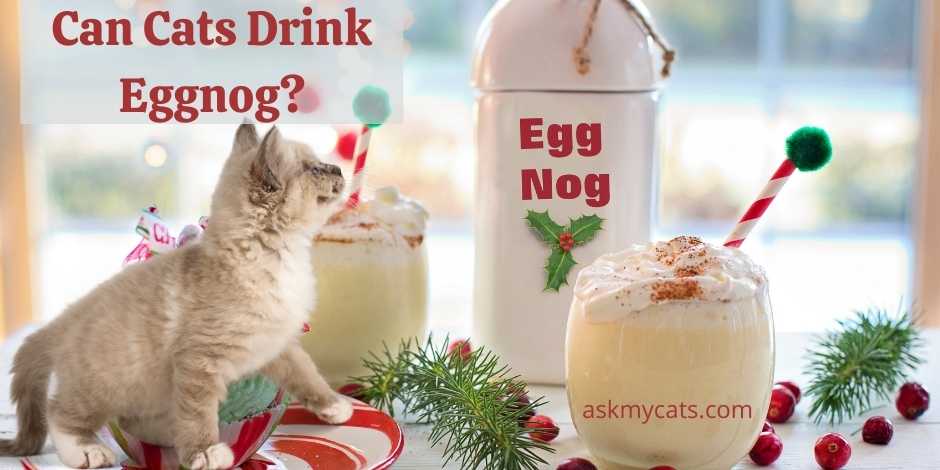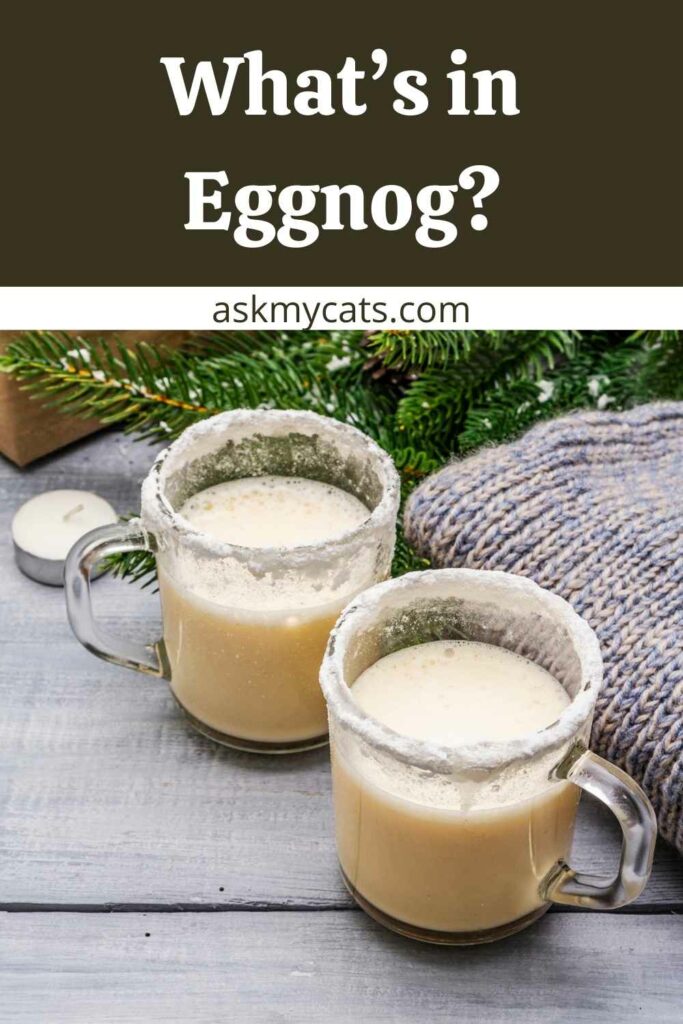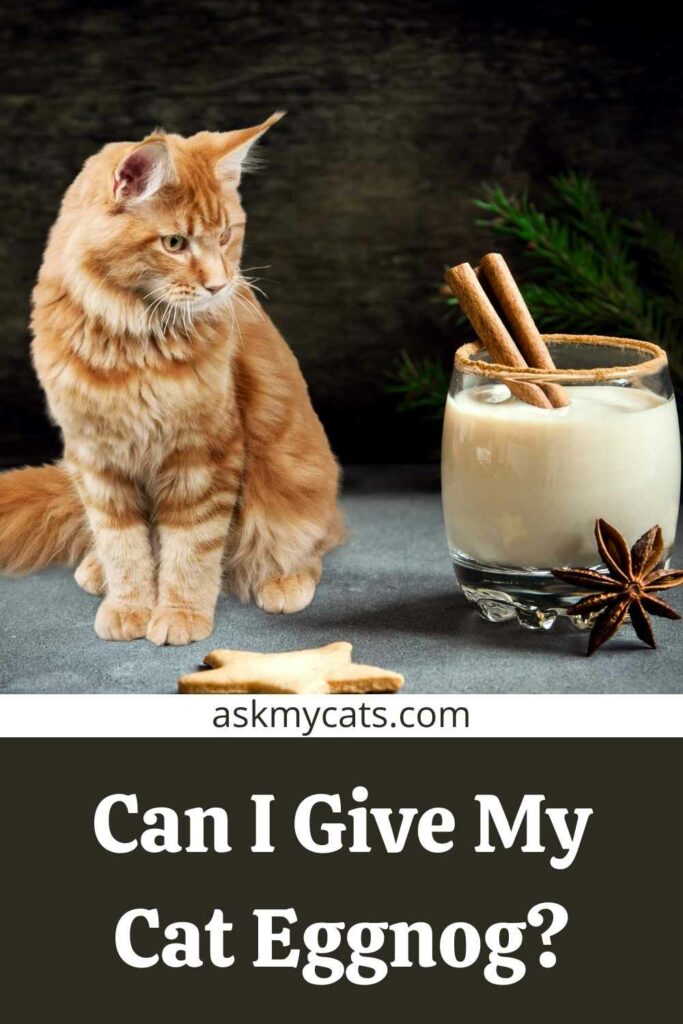Over the holidays, there are a number of potential risks to be aware of as a pet owner. Festive meals, beverages, decorations, lighted candles, seasonal plants, and, of course, the Christmas tree is just a few examples.
This takes me to eggnog, which is one of those drinks that you either love or detest.
Cats should not drink eggnog as they contain lactose and alcohol which are harmful to your cat.
So, if you’re planning on drinking eggnog this Christmas season and want to know if you may share it with your cat, read this first!


Give Your Cat the Perfect Day
Get the Free Ebook!
What’s in Eggnog?
Eggnog is available in a variety of flavors and spices, and it can be alcoholic or non-alcoholic.

Myristicin, a toxin found in nutmeg, is present. To be lethal, you’d need a lot of it, and eggnog usually includes a lot of it. While a tiny amount will not endanger your cat’s life, it might induce gastrointestinal problems such as vomiting, gas, or diarrhea.
Cinnamon is likewise only harmful in big levels, although lower amounts can cause comparable symptoms. These problems are particularly common in cats with sensitive stomachs or allergies.
If your cat has eaten or breathed a substantial amount of cinnamon, it should be sent to the doctor right once.
Traditional eggnog is made from:
Cinnamon essential oil, on the other hand, is toxic to cats and should never be used with them indoors. Lactose intolerance is a natural trait in cats. Lactose-free milk should be provided to them if they are given any.
Interesting Read: Does Cinnamon Keep Cats Away?
Regular milk causes gastrointestinal issues in most cats, including diarrhoea, gas, constipation, cramps, and blood in the stool. While some people are more tolerant than others, it is still something that should be avoided.
Eggnog is not lactose-free, and depending on the recipe, it contains 40 percent to 70 percent full fat dairy milk.
High-fat diets and foods have been linked to health issues in cats. The problem with eggnog is that it contains a lot of fat from the dairy and eggs. It’s not the type of fat they’d eat in their regular diet, which makes it even more difficult for their digestive system.
Eggs should be limited to one whole egg per cat each week in general, but eggnog includes up to three eggs every 1/2 cup serving. A cat might develop pancreatitis after drinking too much eggnog. In comparison to human pancreatitis, feline pancreatitis is far more severe.
It can make a cat lose its desire to eat or drink, as well as produce severe convulsions, blood in the urine, lethargy, and excruciating discomfort. The survival rate for kittens and old cats is dismal.
Can I Give My Cat Eggnog?
If you look at the components list above, you’ll see that they’re practically all unhealthy for cats. It should thus come as no surprise that you should never give them because cats should not consume eggnog.

Milk and cream should not be consumed by adult cats. Lactose intolerance develops in cats as they become older. Lactose-containing goods can induce stomach problems such as minor pain, diarrhoea, vomiting, and even death.
Sugary meals should not be consumed by cats, despite the fact that they are not harmful. It’s harmful for their teeth, can create gastrointestinal problems, and can eventually lead to obesity, diabetes, and other major health problems.
Cats are not allowed to eat raw eggs. Avidin, a rare protein found in raw egg whites, is known to interfere with the absorption of the B vitamin biotin. This can cause skin irritation as well as a patchy coat.
Nutmeg and cinnamon, like other spices, are likely to induce stomach distress or worse if consumed by your cat. Nutmeg, in particular, carries a chemical known to be hazardous to pets called myristicin.
If you like your eggnog with a little booze, you’re making the beverage even more deadly for your cat. A cat may be placed into a coma with just a few of tablespoons of whiskey, therefore keep them away from all forms of alcohol.
As you can see, the components in egg nog include a long list of things you shouldn’t feed your cat.
If you have an inquisitive cat that is likely to take a sip, please don’t leave your glass or cup alone. Otherwise, you’ll have to clean up after an attack of diarrhoea or vomiting at the very least.
In the worst-case scenario, you’ll have a sick cat in need of veterinary care. This is not what anyone wants over the holidays!
Is Eggnog Safe for Cats?
No, Eggnog is not safe for cats.
Under no circumstances should you give it to your cat. Keep the eggnog out of your cat’s reach by rinsing the cups that were used to consume it.
If they unintentionally drink any, you’ll have to keep an eye on them for the following 72 hours, depending on how much they drank.
Take your cat to an animal hospital straight away if it loses its appetite or looks to be sluggish or in pain.
Can Cats Have Eggnog Without Alcohol?
Yes, eggnog without alcohol is safe for cats.
When done correctly, eggnog is both safe and tasty, and you should drink it. It’s a silky mixture of egg proteins encased in sugar molecules, thinned down with milk and vodka to the perfect sipping consistency.
Alcohol is extremely harmful to cats and dogs. Animals suffering from alcohol poisoning may experience diarrhoea, vomiting, depression, lack of coordination, difficulty breathing, unconsciousness, convulsions, or even death.
If you catch your cat drinking any, put a stop to it right away and monitor them over the following 24 hours or so. If they show any indications of gastrointestinal disorders, consult a veterinarian and follow their recommendations.
What About Silk Nog or Soynog That Doesn’t Have Lactose?
Your cat should not drink these too as they are not suitable for cats.
You may have tried a lactose-free option that works for you if you’re lactose intolerant or allergic to dairy and can’t drink classic eggnog.
Instead of cow’s milk, there are soy, rice, almond, and coconut milk substitutes. If you’re curious, they’re known by a variety of names, including Tofu Nog, Grain Nog, and Soynog, to name a few.
The bad news is that none of these are appropriate for cats. Various substances in these beverages are still difficult for cats to digest, and they’re just as likely to trigger gastrointestinal problems.
A cup of eggnog has a lot of vitamins and minerals – over 400 milligrams of potassium, a third of your daily calcium needs, vitamin B12, B2, vitamin A, and iron, to name a few.
Eggnog is high in calories, fat, and added sugars, and is generally made using eggs, cream, milk, and sugar. There’s also a health danger with eggnog if it’s made with uncooked eggs, which may lead to food poisoning.
Frequently Asked Questions
Is raw egg eggnog safe for cats?
Salmonella, a common cause of food illness, can be found in eggnog produced with raw, unpasteurized eggs. The majority of traditional eggnog recipes call for raw eggs.
Are eggs harmful to cats?
No. Cats should not eat raw eggs. Eggs that have not been boiled can carry pathogens such as Salmonella. Raw egg whites can also be harmful to cats.
Can I give my cat scrambled eggs?
Scrambled or cooked eggs with no salt or spices are safe for cats to consume. However, there is a risk of overfeeding your cat with fat. Consult your veterinarian before giving your cat eggs.
Final Words
Eggnog is toxic to cats, as well as most other domestic animals such as dogs. Count yourself lucky if your cat has had a sneaky sip previously and shown no indications of being sick.
This festive drink is really a concoction of elements that will very surely upset a cat’s stomach, if not cause death.
If you have any questions, leave it in the comments section below.

Abigail,
Thank you so much for your input on cats and eggnog. I have had cats my whole life (I know, people tend to exaggerate at times and having or ‘being around’ cats when in fact it’s the neighbors across the hall and they visited a few times a year, but I have actually owned cats and where I moved they came with me. I grew up with cats and we had 13 for several years until there was an especially bad drought one Summer and we lost 6 to coyotes! But I had a Maine Coon Cat named MacGregor (Mac) who lived 22 to 22.5 years and I had him since age ≈ 1(adopted when he was almost fully grown) and I bought a Persian with jet black fur and copper eyes named Bagheera at 3 months old and he lived to be 22 (actually missed his birthday by 2 weeks but he was having seizures and I couldn’t let him suffer any longer but I was a total wreck afterwards) but it’s love. Imagine 22 years (with maybe 5-7days/year total missed) in which they got at least an hour but usually 3+ hours every day of playing, brushing, loving(petting, scritching under the chin and behind the ears, etc) and you would get a much better quality and thus, quantity of life. No, not everyone has that kind of time, I understand, but it still holds that that’s what I tell people who are expecting some magical formula. We thrive in such an environment, so why would our 4-legged children be any different? Still, it’s hard to stay completely up to date on everything that is/isn’t edible and so I am very appreciative of your knowledge and willingness to share that knowledge. Merry Christmas and/or Happy Hannuka (sp?) and Happy New Year!
It’s wonderful to hear from someone with such deep experience and love for cats! It sounds like MacGregor and Bagheera had incredibly long and happy lives thanks to the care and affection you gave them. Your dedication to them really shines through in your stories, and I’m sure they were grateful for every moment you spent with them.
I completely agree—spending quality time with our pets, along with regular care and attention, makes a huge difference in their lives. It’s always a challenge to stay on top of everything that’s safe and healthy for them, but it’s clear you’ve done an amazing job with your cats over the years.
Thank you for the holiday wishes! Merry Christmas and Happy Hanukkah to you as well, and here’s to a joyful and prosperous New Year! If you have any more questions or need advice, I’m always here to help. 🐾🎄